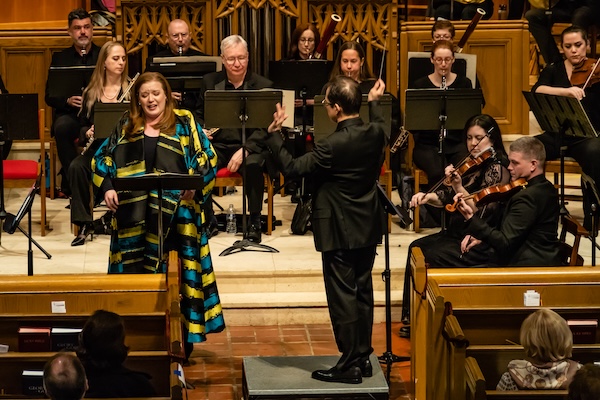Mezzo’s Wagner songs provides highlight of Apollo Orchestra concert

Jennifer Johnson Cano performed Wagner’s Wesendonck Lieder with David Chan conducting the Apollo Orchestra on Sunday. Photo: Shalev “Stan” Weinstein
The Apollo Orchestra continues its season split between two conductors. David Neely led two performances last fall, ceding the baton to David Chan this spring. Chan, one of the concertmasters of the Metropolitan Opera Orchestra, made the strongest showing in opera selections in his stand with the orchestra last season. The results this time around were much the same, as heard Sunday afternoon at Chevy Chase Presbyterian Church.
Julie Vidrick Evans, director of music at the host church, joined as organ soloist in the opening work, the Adagio in G Minor once attributed to 18th-century Venetian composer Tomaso Albinoni. Musicologist Remo Giazotto, the composer’s biographer, actually wrote this score, passing it off as semi-plausible Albinoni.
Chan’s crisp tempo prevented the piece, often sentimentalized, from bogging down under its own weight. Evans, seated at the organ console above the altar, was not always in lockstep with him, but the overall ensemble was generally clean. Concertmaster Claudia Chudacoff’s impassioned violin solos ornamented transitions, with fitfully mixed intonation.
The highlight of the concert was an excellent rendition of Richard Wagner’s Wesendonck Lieder, in the orchestration completed after the composer’s death by Felix Mottl. Mezzo-soprano Jennifer Johnson Cano, last heard about a decade ago, gave a splendid rendition of the vocal part. Her husband, pianist Christopher Cano, has led Washington National Opera’s Cafritz Young Artists program since 2022, and the area will hopefully hear more of her going forward.
The mezzo deployed an exquisite instrument in these songs, often described as sketches for Wagner’s Tristan und Isolde. With impeccable intonation and breath support, Johnson Cano easily reached the compass demanded by the score, her rich and burnished chest voice capped by a lovely bloom of sound at the top, heard prominently in the fourth song.
Chan led the orchestra with confidence, producing a full-throated sound appropriate to the smaller room, even with only around twenty string players. Principal oboist Noelle Drewes added plaintive beauty in her solos in the second song. The sound of the whole viola section proved better than the slightly sour viola solos in the third song, but overall the orchestra matched Johnson Cano with well-balanced beauty.
A performance of Beethoven’s Sixth Symphony (“Pastorale”) failed to come off with the same effortless grace. The horns had a few off moments and an early entrance in the first movement, followed by one from the double basses in the second. Chan set a pleasing walking tempo to start, but his beat did not always come across clearly, particularly in the second movement.
String intonation remained less than ideal, but the bird call solos from flute, oboe, and clarinet sparkled at the end of the second movement. In the trio of the third movement, the string drone overwhelmed the woodwinds at times. As the party depicted in the music of the third movement got out of control, the piccolo, brass, and timpani added raucous sounds for the thunderstorm of the fourth movement, providing a crackle of excitement in an otherwise underwhelming rendition of this Beethoven standard.
David Chan conducts the Apollo Orchestra in Hindemith’s Symphonic Metamorphosis of Themes by Carl Maria von Weber and Mahler’s Fourth Symphony, featuring soprano Ying Fang, 4 p.m. June 2. apolloorchestra.com
